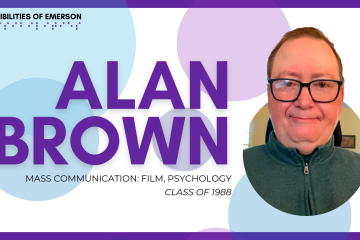Holly received her BS in Communication Disorders in 1984 where she got a wealth of support and guidance from the accomplished faculty at Emerson as she began her studies in speech pathology. She currently has her own private practice in NY.

Holly Weinstock ’84
Share with us some highlights of your time in the Communication Disorders department at Emerson and how it prepared you for graduate school:
College, especially my undergrad studies, was full of many life lessons. Coming from a small town in Pennsylvania to Boston was a bit of a culture shock. My time at Emerson gave me the foundation that I needed to proceed to a Master’s degree. My professors were world-renown. Many wrote the definitive works on their specialties. However, despite their hectic schedules and speaking engagements, the faculty always had time for you. Each professor was known to me by their first name. Gerry Wallach and David Luterman’s classes, in particular, were key to helping me become the speech-language pathologist that I am today. I tease my Emerson friends that I was memorizing the cranial nerves in anatomy and physiology class while they were making films and plays.
What does representation for womxn mean for you in the field of speech pathology?
According to the American Speech and Hearing Association, about 96% of speech-language pathologist are women. However, I am lucky to work in a field that promotes and supports the advancement of all genders. The women I have worked with in my studies, private practice, and conferences continue to inspire me. We have learned so much from each other and it’s a network with very strong bonds. If one hears or reads about new techniques or breakthrough’s, they immediately share the information with their colleagues who in turn share with their extended network and so on. I’ve been mentored by some incredible women who have encouraged and empowered me to become the best professional I can be. Most importantly, through their example, I learned to never stop asking questions and to be kind and patient.
What professional affiliations, groups, or general networking advice would you offer femme-identifying students at Emerson?
It’s important to be involved with your professional associations on the national and state level. I am a member of the American Speech and Hearing Association and New Jersey Speech and Hearing Association. I’ve served on committees and was the Convention Chair for the New Jersey Speech and Hearing Association Convention. I’ve met experts from across the country while working with NJSHA.
I’ve met so many people at Emerson’s alumni weekends. Regardless of the year of graduation, it’s always wonderful The reunion years don’t matter to meet new friends and reconnect with old friends (not so old). Emerson Alumni events, ASHA , and NJSHA Conventions have been great places to network. I am never surprised to meet someone with some connection to Emerson at any event. Volunteering in these organizations is a great way to stay involved and learn about the latest news and trends.
There’s a lot of conversation about professional allies, both for women supporting one another and then supporting women. What do you think makes great allyship?
I have always stayed connected with my supervisors, professors, and friends from school and work. These relationships have been invaluable to me and I consider them as members of my extended family. These remarkable people have been there to encourage and support me throughout my career. I know that we can call each other when we need opinions or advice on our cases. No question is ever too silly. We are in this together and will always support each other.


